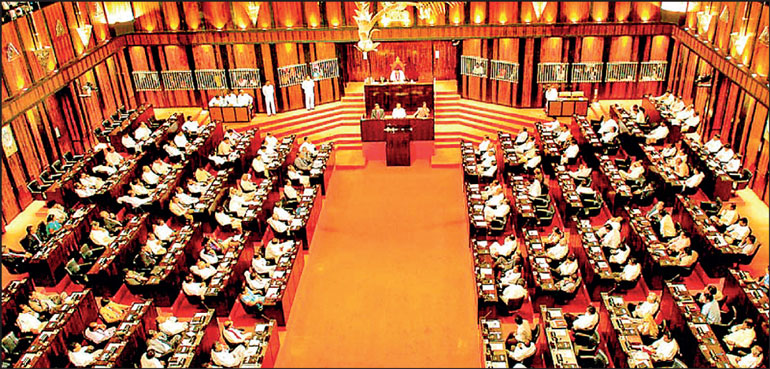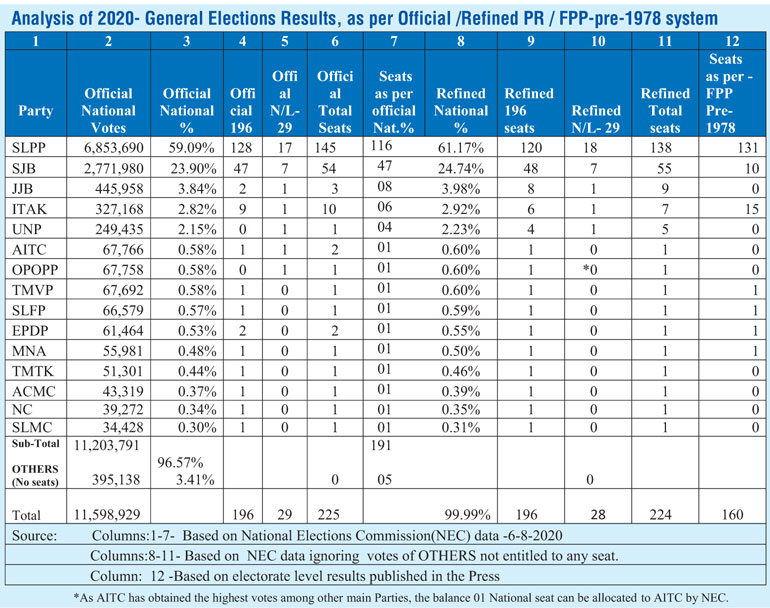Monday Feb 23, 2026
Monday Feb 23, 2026
Saturday, 22 October 2022 00:10 - - {{hitsCtrl.values.hits}}

It is still puzzling and saddening that the PSC despite its summoning an array of external academic expertise and practical knowledge to evolve robust reforms, has ended up with more or less cosmetic additions to the existing electoral system and missed out on several fundamental ‘reforms/system changes’ to effectively meet its avowed objectives
 1.0 Preamble
1.0 Preamble
1.1 A Parliamentary Select Committee (PSC) was appointed in May 2021 to identify appropriate reforms in the election laws and the electoral system and to recommend necessary amendments. 16 MPs representing all parties (17th member resigned from Parliament) held 29 meetings and took more than double the targeted timeframe of six months to report to the Parliament. According to its well-documented report, the PSC has accepted oral/written evidence from 36 recognised political parties, 10 of which represent the current Parliament.
On invitation, representatives of 18 organisations including six women’s and eight media organisations have appeared before the Committee. In the process, the PSC has made 25 observations and given 15 recommendations under sub-heads such as Election Systems, Women’s Representation, Youth Representation, Recognition of Political Parties, Media, Election campaigning, Voting Rights, Nomination Process, Electoral Process, An Election Tribunal, National list, Delimitation Commission and 3 minor issues on Local Govt. practices. The report is signed only by eight members (50%) all of whom are from the governing party.
1.2 It is pertinent to state that an Experts Committee of nine members appointed by the Cabinet in October 2020 to draft a New Constitution (which itself contains a chapter captioned ‘Franchise and Elections including Referenda’) was supposedly on the verge of completing their prolonged task when the PSC was appointed. Ironically, the PSC report saw the light of the day at a time when the ‘Gota Go Home’ and ‘Ditching the 225’ campaign launched initially by the ‘Peaceful and intelligent youth at the ‘Aragala Bhoomiya’ – Galle Face, opened the doors to the silent public to inter alia urge ‘system changes’ in our defective electoral laws and systems.
1.3 The report per se has some good recommendations in regard to women/youth representation; media guidelines, election campaign finance, advance voting rights, electronic voting system, counting of votes and election tribunals, etc. However, in our view most of them constitute oiling the existing election machinery and tightening some of its bolts and nuts. Thus, they can hardly be considered as full-fledged ‘electoral reforms’ or ‘system changes’ as the PSC report is devoid of critical ‘system changes’ such as guaranteeing equality of vote and quality of MPs as upstaged by the peaceful ‘Aragalaya’. On the other hand, it is not surprising, as any PSC will have traditional people’s representatives as members who as usual will ignore ‘out of the box’ system changes from the principal stakeholders, in order to safeguard their vested interests without ‘upsetting the apple cart’! In other words they have staged ‘Hamlet without the Prince of Denmark’ – the sovereign voter! The same drama appears to have been staged by the ‘Experts Committee’ to draft a new constitution.
Be that as may, it is still puzzling and saddening that the PSC despite its summoning an array of external academic expertise and practical knowledge to evolve robust reforms, has ended up with more or less cosmetic additions to the existing electoral system and missed out on several fundamental ‘reforms/system changes’ to effectively meet its avowed objectives.
1.4 Listed below are some unattended critical ‘system changes’ supported with logical solutions, submitted by the writer to both PSC and the ‘Experts Panel’ and communicated to the concerned authorities directly and through the press.
2.0 Unattended critical system changes towards more democracy, accuracy, meritocracy and Sri Lankan-ness
2.1 Comply with UN declared democratic ‘Equality of Vote’
Solution: To guarantee an equal value to each valid vote and accurately determine the rightful number of seats won by seat winning parties, in the National Parliament, consider the country as a ‘Single Electorate’ and apply simple % arithmetic to the Net National aggregate of valid votes (obtained by excluding total votes of parties who have not won a single seat as categorised under ‘Others’). Thereafter, determine the district-wise seats won by each such party by applying % arithmetic to their total no. of national seats already won and the total valid votes obtained in each district/electorate by each such party.
2.2 Ensure ‘political professionals’ as people’s representatives
Solution: Firstly abolish the optional Preference Voting (PV) mechanism. Thereafter, the National Elections Commission (NEC) shall legally mandate the contesting parties to select the final names of their candidates strictly under the procedure outlined below to ensure that voters are not saddled again with selecting mythical ‘horses’ from given lists of satirical ‘donkeys’!
2.2.1 Selecting and electing ‘political professionals’ including women and youth (20% each)
a) Since it is essential to have genuine ‘political professionals’ who place ‘Country First’ to represent the sovereign voters, the NEC shall depending on the needs of the times, lay down compulsory eligibility criteria and a structured interview marking system for contesting parties to select such ‘political professionals’ as their candidates in merit order.
(As a result lawyers, accountants, bankers, economists and wise and experienced political professionals who are best positioned to discharge the objectives and functions of a National Legislature will occupy the ‘225’seats. More details have appeared in the previous press articles)
b) To ensure the required % (ideally 20% each) in women and youth participation, as stipulated by the NEC, the parties should add suitable extra marks to the pre-interview marks of such applicants to rank them on the basis of 1 woman and 1 youth among every 5 candidates in the final nomination lists.
2.3 Amend ‘adhoc ratios’ in MMV system and secure an equal opportunity for all parties to enter their nominees in merit order under any one of lists captioned PR, FPP and Central-Pool
Note: So long as NEC ensures fundamental accuracy of the seat allocation (as per 2.1 above) and guarantee nomination of ‘political professionals’ to occupy the 225 seats (as per 2.2 above), we do not see any further need for NEC to intervene and stipulate adhoc ratios to the parties for assigning their candidates to any particular geographical area. Alternatively, parties can be given a free hand to assign their candidates as per their choice list as mentioned above. The voters are also free to consider the quality of the candidates and their places of assignments in terms of the party list when they decide on which party to vote.
Note: The above method has to be applied to PC Elections as well considering the district as the ‘Electoral Unit’.
2.4 Stipulate objective oriented mandatory criteria to nominate 29 National List MPs, to ensure representation of all communities and expertise in the Parliament.
2.5 Install true ‘Sri Lankan ness’ with proportionate representation of seat wining parties in the Cabinet leading to a ‘Permanent National Govt.’
2.6 Brand the ‘5 year Party Election Manifesto’, as a regulated, prosecutable document and convince the voter to make it the primary determinant for a wise voter decision.
2.7 Ban ‘Cross overs’ to ensure an ethical and a consensual political culture sans ‘corrupt deals’.
2.8 Transform irreversible Provincial Councils to more efficient units and rationalise the role and benefits of National level MPs to meet specific objectives of the Parliament.
2.9 Depoliticise Local Govt. Elections to ensure fair and uncorrupt assistance to people through election of respectable, acceptable and sociable ‘Independent’ candidates in the locality.
2.10 Take cost-effective steps such as legally specified dates to hold at least 2 National level elections on the same day to ensure maximum productivity of the electoral system.
2.11 Complete all pre-requisites to abolish Executive Presidency and install a Governor General with limited powers through the vote of Parliament and PC members as detailed below.
3.0 Abolition of Executive Presidency
a) Firstly, repeal 20th Amendment and restore 19th Amendment after suitable changes together with additional clauses by approving 21st Amendment and ensure that the Interim President will not enjoy dictatorial powers.
b) Simultaneously, adopt a specific formalised timeframe for abolition of Executive Presidency paving the way for a ‘Parliament and PC elected Governor General’ with limited powers through 22nd Amendment
c) Secondly, approve 22nd Amendment to abolish Executive Presidency and install a ‘Parliament and PC Member elected Governor General’ undertaking responsibility to ensure implementation of Parliamentary and Decentralised Budgets through the Provincial Councils headed by Provincial Governors as and when approved by the Parliament. (Refer 2.8 above). If possible, the responsibility for execution of the approved laws as well as programs in the ‘Election Manifesto’ of the Governing Party as and when approved by the Parliament may also be vested on him/her.
d) The above amendments should go in to statute books during the tenure of the ‘Interim Govt.’ within one year to enable holding a General Election with required ‘system changes’ as early as possible.
Note: The detailed methodology to effect other ‘system changes’ have already been published in national newspapers.

4.0 Approve above critical ‘system changes’ to be effective for any future election
5.0 Concluding note
The above package of ‘system changes’ is aimed at providing a more democratic, patriotic, simple, and a cost-effective alternative with minimum changes to the existing complex ‘MMV System’, in order to facilitate approval by an ‘Interim-All/Multi Party Govt.’ mechanism sans a referendum, and paving the way for the next general and/or other elections within one year.
If not, the curse of the ‘225’ will re-surface throwing our motherland to the dustbin of history!
(The writer is a retired Deputy General Manager of BOC. He can be reached via email: [email protected].)